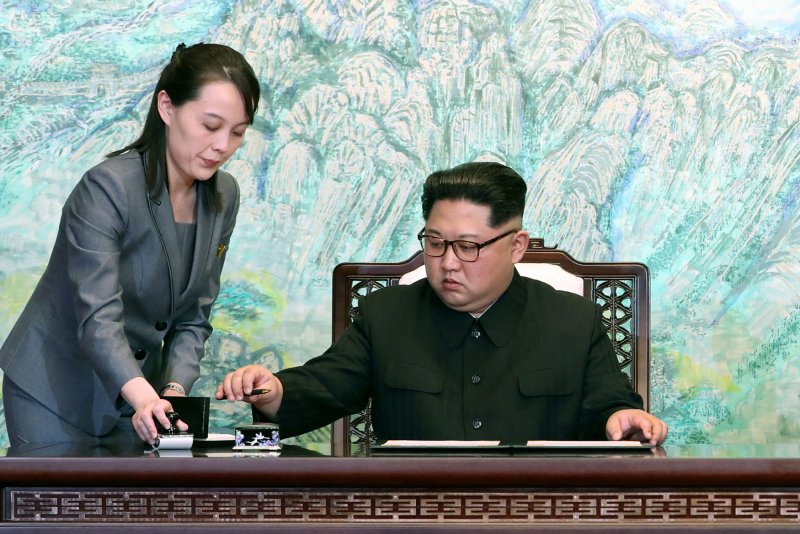Kim Jong Un at the Peace House in the border village of Panmunjom in South Korea in April 2018. Fears of conflict have subsided in the South, but some defectors are worried about their future, a South Korean researcher said Thursday. File Photo by Inter-Korean Summit Press Corps/UPI |
License Photo
SEOUL, March 7 (UPI) -- North Korean defectors who responded to a South Korean survey conducted in December are voicing greater concern about their safety in the South, a South Korean researcher said Thursday.
The results of the survey from Seoul-based Database Center for North Korea Human Rights come after South Korean President Moon Jae-in's summits with Kim Jong Un changed the tone of inter-Korea relations; Seoul is pursuing a pro-engagement policy with Pyongyang.
The fear of an armed conflict with the Kim regime has receded, but defectors in the recent study say their feelings of insecurity have increased with the change in administration, from the conservative former President Park Geun-hye to the progressive Moon.
"Some defectors said, 'What if I am repatriated? This government appears likely to repatriate [North Korean defectors]'," said Soonhee Lim, chief director of North Korean Human Rights Archives at NKDB, referring to past conversations with refugees.
Worries about repatriation made participants think twice about responding to the survey, Lim said.
About 32,000 defectors have resettled in the South, and their rising number has brought a diversity of backgrounds and views among the population. Last year, the North Korean manager of a group of waitresses who fled China told a local news network he and others were "lured and kidnapped" to the South during former Park's term of office.
The statement caused an uproar; acquaintances of the waitresses said at least some of the women do not seek repatriation.
Heo Kang-il, the North Korean manager who accused South Korean spies of forcibly taking the group out of China, has since stepped out of the spotlight. But South Korean media attention on defectors is not always flattering, and a cause for worry, said Yeosang Yoon, chief director of NKDB.
"Even a minor inaccuracy in reporting about our [past] surveys creates misinterpretation, as well as feelings of hurt" among defectors, Yoon said Thursday at the conference on his organization's survey results.
Yoon said the results of a previous poll, which indicated 20 percent of respondents expressed some desire to return to their North Korean hometown, was controversial. A figurative expression of wanting to "go home" was grossly misconstrued as anti-South Korea; in response, South Korean commenters urged refugees to "go back to North Korea," according to Yoon.
A complicated picture
Stories of unhappy defectors unable to adjust to life in the South have some grounding in reality, but NKDB's latest research shows changes in the old patterns.
In the group of 414 resettled North Koreans NKDB surveyed in December 2018, 77 percent said they were satisfied with their housing situation; refugees from the North are usually provided with housing subsidies.
Researcher Teodora Gyupchanova said defectors are also optimistic about achieving parity with their South Korean peers; 70 percent said they believe they could achieve equality in the South, despite major differences of identity. More than 70 percent of the respondents said they would "never" go back to North Korea, while many others said they found it "very difficult" to understand why any defector would seek repatriation, Gyupchanova said.
The non-governmental survey is also fleshing out a complex mosaic of the North Korean experience in the South.
North Koreans in the study identified the most with large-scale ideas, such as that of a unified "one Korean nation," and identified the least with their local communities, which can include other defectors like themselves.
Respondents also said South Koreans were perceived as being more reliable than fellow defectors in times of need. The defectors gave the South Korean government the most credit for trying to improve human rights in North Korea, rating it higher than the United Nations or any other member of the international community for human rights policy, according to survey results.















